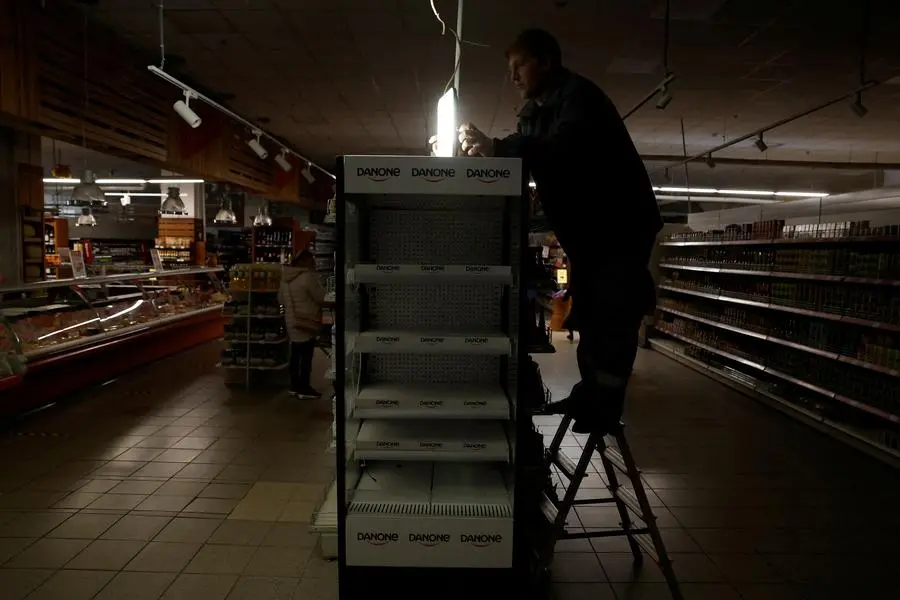PHOTO
President Volodymyr Zelenskiy appealed to Ukrainians to conserve energy amid relentless Russian strikes that have already halved the country's power capacity, as the United Nations' health body warned of a humanitarian disaster in Ukraine this winter.
Authorities said millions of Ukrainians, including in the capital Kyiv, could face power cuts at least until the end of March due to the strikes. Citizens in the recently liberated southern city of Kherson may apply to be relocated to areas where heating and security problems are less acute, they said.
Temperatures have been unseasonably mild this autumn, but are starting to dip below zero and are expected to drop to -20 Celsius (-4 Fahrenheit) or even lower in some areas during the winter months.
Russia has been targeting Ukrainian power facilities with rocket strikes after a series of battlefield setbacks that have included withdrawing its forces from Kherson city to the east bank of the mighty Dnipro River that bisects the country.
"The systematic damage to our energy system from strikes by the Russian terrorists is so considerable that all our people and businesses should be mindful and redistribute their consumption throughout the day," Zelenskiy said in his nightly video address.
"Try to limit your personal consumption of electricity."
The World Health Organization (WHO) said hundreds of hospitals and healthcare facilities lacked fuel, water and electricity to meet people's basic needs.
"Ukraine's health system is facing its darkest days in the war so far. Having endured more than 700 attacks, it is now also a victim of the energy crisis," Hans Kluge, WHO's regional director for Europe, said in a statement after visiting Ukraine.
BLANKETS
Workers were racing to repair damaged power infrastructure, Sergey Kovalenko, the head of YASNO, which provides energy for Kyiv, said on Monday.
"Stock up on warm clothes, blankets, think about options that will help you get through a long outage," Kovalenko said. "It's better to do it now than to be miserable."
In a Telegram message for Kherson residents - especially the elderly, women with children and those who are ill or disabled - Deputy Prime Minister Iryna Vereshchuk posted a number of ways residents can express interest in leaving.
"You can be evacuated for the winter period to safer regions of the country," she wrote, citing both security and infrastructure problems.
Kremlin spokesman Dmitry Peskov said the blackouts and Russia's strikes on energy infrastructure were the consequences of Kyiv being unwilling to negotiate, the state TASS news agency reported late last week.
Ukrainian presidential adviser Mykhailo Podolyak said Russia was bombarding Kherson from across the Dnipro River, now that its troops had fled.
"There is no military logic: they just want to take revenge on the locals," he tweeted late on Monday.
Ukraine's Suspilne news agency reported fresh explosions in Kherson city on Tuesday morning.
Moscow denies intentionally targeting civilians in what it calls a "special military operation" to rid Ukraine of nationalists and protect Russian-speaking communities.
Kyiv and the West describe Russia's actions as an unprovoked war of aggression.
The nine-month war has killed tens of thousands, uprooted millions and pummelled the global economy, driving up food and energy prices. The Organisation for Economic Cooperation and Development (OECD) said on Tuesday the world's worst energy crisis since the 1970s would trigger a sharp slowdown, with Europe hit hardest.
RAID ON MONASTERY
Ukraine's SBU security service and police raided a 1,000-year-old Orthodox Christian monastery in Kyiv early on Tuesday as part of operations to counter suspected "subversive activities by Russian special services", the SBU said.
The sprawling Kyiv Pechersk Lavra complex - or Monastery of the Caves - is a Ukrainian cultural treasure and the headquarters of the Russian-backed wing of the Ukrainian Orthodox Church that falls under the Moscow Patriarchate.
Russia's Orthodox Church condemned the raid as an "act of intimidation".
Battles continued to rage in the east, where Russia has sent some of the forces it moved from around Kherson in the south, pressing an offensive of its own along a stretch of frontline west of the city of Donetsk held by its proxies since 2014.
"The enemy does not stop shelling the positions of our troops and settlements near the contact line (in the Donetsk region)," the General Staff of the Ukrainian Armed Forces said on Tuesday.
"Attacks continue to damage critical infrastructure and civilian homes."
Four people were killed and four others wounded in Ukraine-controlled areas of Donetsk region over the past 24 hours, regional governor Pavlo Kyryleno said on Telegram messaging app.
Russian shelling also hit a humanitarian aid distribution centre in the town of Orihiv in southeastern Ukraine on Tuesday, killing a volunteer and wounding two women, the regional governor said.
Orihiv is about 110 km (70 miles) east of the Zaporizhizhia nuclear power station which has been shelled again in the past few days, with Russia and Ukraine trading blame for the blasts.
Experts of the International Atomic Energy Agency (IAEA) toured the site on Monday. The agency, which has repeatedly called for an immediate cessation of hostilities in the area to avoid a major disaster, said the experts found widespread damage but nothing that compromised the plant's essential systems.
The Kremlin said on Tuesday that no substantive progress had been made towards creating a security zone around the nuclear plant, Europe's largest.
(Reporting by Oleksandr Kozhukhar and Maria Starkova in Kyiv, Lidia Kelly in Melbourne and Ronald Popeski in Winnipeg; Writing by Shri Navaratnam and Gareth Jones; Editing by Lincoln Feast and Alex Richardson)





















